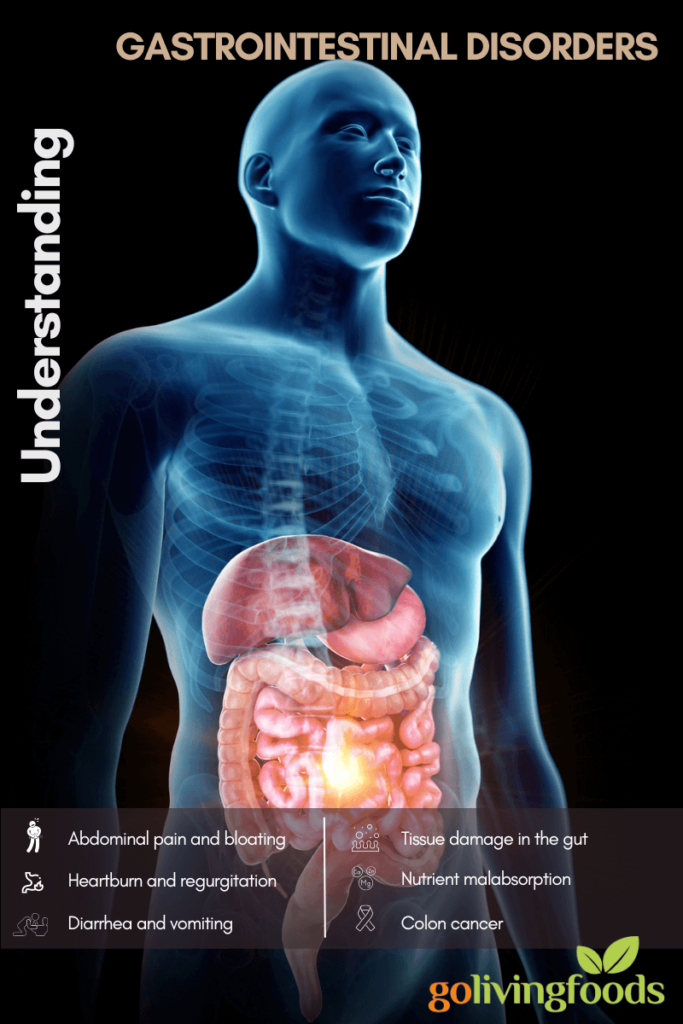What is the Relevance of Anthocyanin Actions at the Gastrointestinal Tract ?

In recent years, there has been a growing interest in the potential health benefits of anthocyanins, the natural pigments responsible for the vibrant colors in various fruits and vegetables. These compounds have garnered attention due to their powerful antioxidant properties, which are believed to play a vital role in promoting overall health. Beyond their antioxidant effects, emerging research suggests that anthocyanins may also exert beneficial actions within the gastrointestinal tract, the complex system responsible for digestion, nutrient absorption, and immune function.
The gastrointestinal tract, often referred to as the gut, is not only responsible for processing the food we consume but also plays a crucial role in our overall well-being. A well-functioning gastrointestinal tract is essential for optimal nutrient absorption, immune support, and maintaining a healthy gut microbiota—the vast community of microorganisms residing in our intestines.
In this comprehensive review, we will delve into the potential relevance of anthocyanin actions at the gastrointestinal tract and explore the scientific evidence supporting their impact on gut health. Through a careful analysis of recent studies, we aim to provide an informative and scientifically accurate understanding of how anthocyanins may contribute to gastrointestinal well-being. Let us embark on this journey to uncover the secrets behind these fascinating plant compounds and their potential role in supporting a healthy gut.
Understanding Anthocyanins
Anthocyanins belong to the flavonoid family, a group of polyphenolic compounds found abundantly in fruits, vegetables, and certain grains. They are responsible for the bright red, purple, blue, and violet colors in berries, cherries, grapes, pomegranates, red cabbage, and many other plant-based foods. Beyond their role in imparting vivid colors to these edible delights, anthocyanins are renowned for their powerful antioxidant and anti-inflammatory properties.
In recent years, researchers have shown considerable interest in anthocyanins due to their potential health benefits. Studies have revealed that these compounds can neutralize harmful free radicals, unstable molecules that can damage cells and contribute to chronic diseases. Additionally, anthocyanins have demonstrated the ability to modulate various signaling pathways in the body, influencing processes such as inflammation, cell proliferation, and gene expression.
Their ability to interact with various biological pathways raises intriguing questions about how anthocyanins may impact the gastrointestinal tract.
Understanding gastrointestinal tract
The gastrointestinal tract is a complex and dynamic system that includes several vital components, such as the esophagus, stomach, small intestine, large intestine, and colon. Each part of this extensive system plays a unique role in the digestion and absorption of nutrients. The gut also houses a vast community of microorganisms known as the gut microbiota, which plays a significant role in maintaining gut health and overall well-being.
However, several factors can influence the delicate balance of the gastrointestinal tract and potentially lead to gastrointestinal disturbances and diseases. Common gastrointestinal conditions include:
1. Irritable Bowel Syndrome (IBS)
A functional gastrointestinal disorder characterized by abdominal pain, bloating, and changes in bowel habits. The exact cause of IBS remains unclear, but inflammation and gut motility issues are believed to contribute to its development.
2. Gastroesophageal Reflux Disease (GERD)
A chronic condition in which stomach acid flows back into the esophagus, causing symptoms such as heartburn and regurgitation. Prolonged exposure to stomach acid can lead to inflammation of the esophagus.
3. Inflammatory Bowel Disease (IBD)
A group of chronic inflammatory conditions that affect the gastrointestinal tract, including Crohn’s disease and ulcerative colitis. These conditions are characterized by inflammation and tissue damage in the gut.
4. Celiac Disease
An autoimmune disorder triggered by the ingestion of gluten, a protein found in wheat, barley, and rye. In individuals with celiac disease, the immune system attacks the small intestine lining in response to gluten ingestion, leading to inflammation and nutrient malabsorption.
5. Gastroenteritis
Inflammation of the stomach and intestines, usually caused by viral or bacterial infections. It can lead to symptoms like diarrhea, vomiting, and abdominal pain.

6. Colon Cancer
A type of cancer that begins in the colon or rectum and may develop from precancerous polyps. Diet and lifestyle factors play a significant role in the development of colon cancer.
The gastrointestinal tract’s susceptibility to these conditions emphasizes the need for interventions that can support gut health and minimize the risk of gastrointestinal diseases.
Anthocyanin Actions in the Gastrointestinal Tract
Understanding how anthocyanins may influence the gastrointestinal tract can provide valuable insights into their overall impact on gut health.
Anthocyanins’ chemical structure allows them to exert their beneficial effects within the gastrointestinal tract through several key mechanisms:
1. Antioxidant Activity
Anthocyanins are powerful antioxidants that can neutralize harmful free radicals in the gut. Free radicals can damage cells and contribute to Oxidative Stress, which has been linked to various gastrointestinal diseases. By scavenging free radicals, anthocyanins help protect the gut lining and maintain its integrity.
2. Anti-Inflammatory Effects
Inflammation is a natural response of the immune system to protect the body against harmful invaders. However, chronic inflammation in the gastrointestinal tract can lead to tissue damage and contribute to the development of gastrointestinal diseases, including inflammatory bowel disease and gastroesophageal reflux disease. Anthocyanins’ anti-inflammatory properties have garnered attention as a potential means to manage gut inflammation.
Research suggests that anthocyanins can inhibit the production of pro-inflammatory molecules in the gut, such as cytokines and chemokines. By reducing the inflammatory response, anthocyanins may help alleviate gut discomfort and promote gut health.
Moreover, anthocyanins may also regulate the activity of nuclear factor kappa B (NF-κB), a key transcription factor involved in the inflammatory process. By modulating NF-κB activity, anthocyanins may exert anti-inflammatory effects within the gastrointestinal tract.
3. Gut Microbiota Modulation
The gut microbiota, composed of trillions of beneficial bacteria, plays a fundamental role in gut health and overall well-being. These bacteria contribute to various physiological processes, including digestion, metabolism, and immune function. Imbalances in the gut microbiota, known as dysbiosis, have been associated with gastrointestinal disorders.
Emerging evidence suggests that anthocyanins can modulate the composition of the gut microbiota. Studies have shown that these compounds can selectively promote the growth of beneficial bacteria, such as Bifidobacterium and Lactobacillus, while inhibiting the growth of harmful bacteria, such as Escherichia coli (E. coli).
By promoting the growth of beneficial bacteria, anthocyanins may create a favorable gut environment that supports overall gut health. Additionally, the breakdown products of anthocyanins during metabolism, known as metabolites, can also influence the gut microbiota composition positively.
4. Gut Barrier Support
The gut lining acts as a barrier, preventing harmful substances from entering the bloodstream. A compromised gut barrier can lead to gut permeability, commonly referred to as “leaky gut.” Studies indicate that anthocyanins can help strengthen the gut barrier by promoting the expression of tight junction proteins, maintaining gut integrity.
5. Regulation of Gut Motility
Proper gut motility is crucial for healthy digestion and nutrient absorption. Anthocyanins have been found to influence gut motility, helping to regulate bowel movements and reduce the risk of gastrointestinal discomfort.
Health Benefits of Anthocyanins in the Gut
Given the diverse actions of anthocyanins within the gastrointestinal tract, it is not surprising that these compounds hold promise in promoting gut health and preventing gastrointestinal diseases.
Some potential health benefits of anthocyanins in the gut include:
1. Gastrointestinal Disease Prevention
The antioxidant and anti-inflammatory properties of anthocyanins may help protect the gut lining from damage and reduce the risk of developing gastrointestinal conditions such as :
2. Gut Comfort and Digestive Health
Individuals experiencing gut discomfort, bloating, or irregular bowel movements may benefit from incorporating anthocyanin-rich foods into their diet. These foods may help soothe gut inflammation and promote gut motility.
Furthermore, Anthocyanins role in supporting gut barrier function and regulating gut motility can contribute to overall gut comfort and smooth digestion.
3. Immune Support
A healthy gastrointestinal tract is essential for a robust immune system. Anthocyanins influence on the gut microbiota can indirectly enhance immune function, as the gut microbiota plays a critical role in training the immune system.

4. Nutrient Absorption
By maintaining gut barrier integrity, anthocyanins may promote efficient nutrient absorption, ensuring that essential nutrients are properly assimilated into the body.
5. Prebiotic Effects
Some studies suggest that anthocyanins can act as prebiotics, providing nourishment to beneficial gut bacteria and promoting their growth.
Dietary Sources of Anthocyanins
Anthocyanins are naturally abundant in various fruits, vegetables, and grains, providing a diverse array of dietary sources. Some of the richest sources of anthocyanins include:
Incorporating these colorful foods into the diet can provide a diverse array of anthocyanins, along with other beneficial nutrients and phytochemicals.
Potential Synergistic Effects with Other Nutrients
In the context of gut health, anthocyanins are not the only dietary components that play a role in maintaining gastrointestinal well-being. Many other nutrients and phytochemicals found in whole foods also contribute to gut health. For example:
Takeaway
Anthocyanins, the colorful pigments found in various fruits and vegetables, offer a range of potential benefits for gastrointestinal health. Their antioxidant, anti-inflammatory, and gut microbiota-modulating properties contribute to the maintenance of a healthy gut environment.
Incorporating a diverse array of anthocyanin-rich foods, along with other gut-friendly nutrients, into a balanced diet may contribute to improved gut health and overall well-being.






